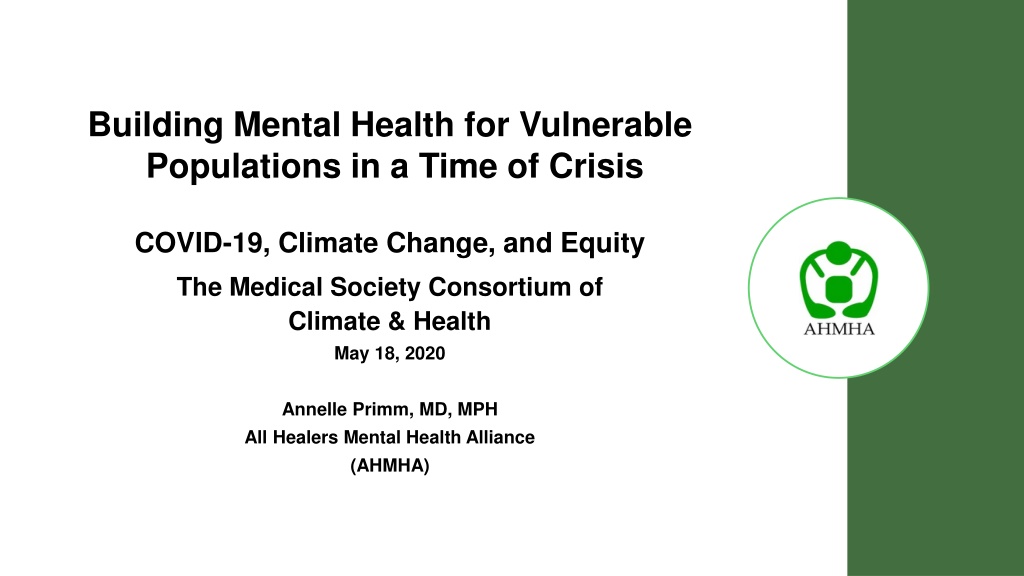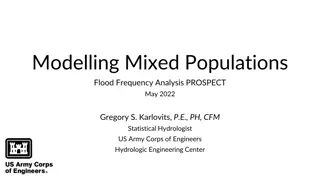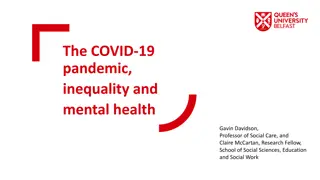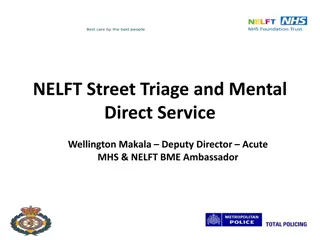Building Mental Health for Vulnerable Populations in Times of Crisis
The All Healers Mental Health Alliance, led by Dr. Annelle Primm, focuses on providing mental health support to marginalized communities post-disaster. They conduct teleconferences, facilitate collaborations, and emphasize key elements like safety and connectedness for effective interventions. The initiative has responded to disasters such as Hurricane Katrina, COVID-19, and other major crises, working towards long-term mental health solutions for those in need.
Download Presentation

Please find below an Image/Link to download the presentation.
The content on the website is provided AS IS for your information and personal use only. It may not be sold, licensed, or shared on other websites without obtaining consent from the author. Download presentation by click this link. If you encounter any issues during the download, it is possible that the publisher has removed the file from their server.
E N D
Presentation Transcript
Building Mental Health for Vulnerable Populations in a Time of Crisis COVID-19, Climate Change, and Equity The Medical Society Consortium of Climate & Health May 18, 2020 Annelle Primm, MD, MPH All Healers Mental Health Alliance (AHMHA)
All Healers Mental Health Alliance A national multidisciplinary group of physicians, mental health professionals, health advocates, faith leaders, and first responders Facilitates culturally appropriate, long-term responses to the mental health needs of marginalized communities in the aftermath of disaster
What We Do Twice monthly teleconference forums for information exchange, resource-sharing and technical assistance for community leaders post- disaster Mobilize collaborations for local healing, resilience, and support services for disaster affected communities, caregivers and first responders
Disasters of Focus Hurricane Katrina, New Orleans and Gulf Coast Superstorm Sandy, New York City Hurricane Irma and Maria, U.S. Virgin Islands Hurricane Harvey, Houston and Port Arthur, TX Hurricane Florence, North Carolina and South Carolina Hurricane Michael, Florida Panhandle COVID-19
Maximizing Mental Health Post-Disaster Calm Safety Self and collective efficacy Connectedness Hope Hobfoll S. E, Watson P, Bell C. C, Bryant R. A, Brymer M. J, Friedman M. J, et al. Five essential elements of immediate and mid-term mass trauma intervention: Empirical evidence. Psychiatry. 2007;70:283 315.
Courtesy of Toni Johnson, MD Former Vice Chair of Psychiatry Eastern Carolina University School of Medicine
Early interventions, such as PFA, can help provide a positive recovery environment for disaster survivors Courtesy of Toni Johnson, MD Former Vice Chair of Psychiatry Eastern Carolina University School of Medicine
Key Takeaways Given the increase in disasters including those related to climate change, clinicians cannot afford not to have adequate training in this area. Serving can create an excellent opportunity to connect with the local communities long after the disaster has ended. Partnering with other agencies and disciplines is the recipe for success. Never underestimate the power of compassion in action. Courtesy of Toni Johnson, MD Former Vice Chair of Psychiatry Eastern Carolina University School of Medicine





























